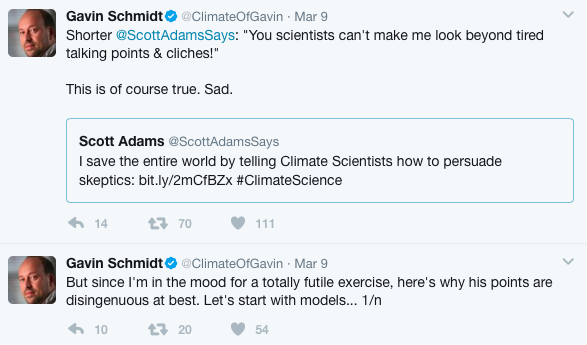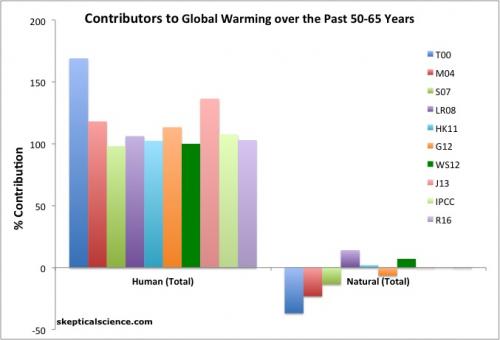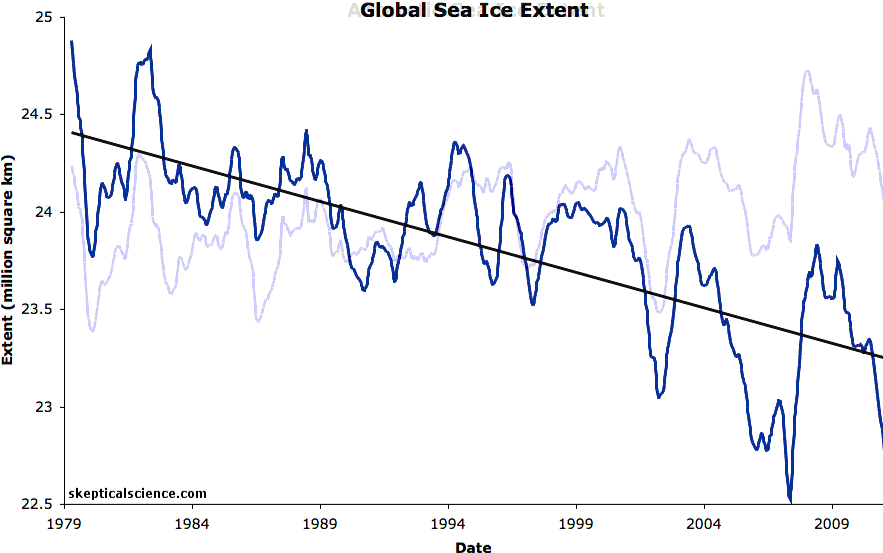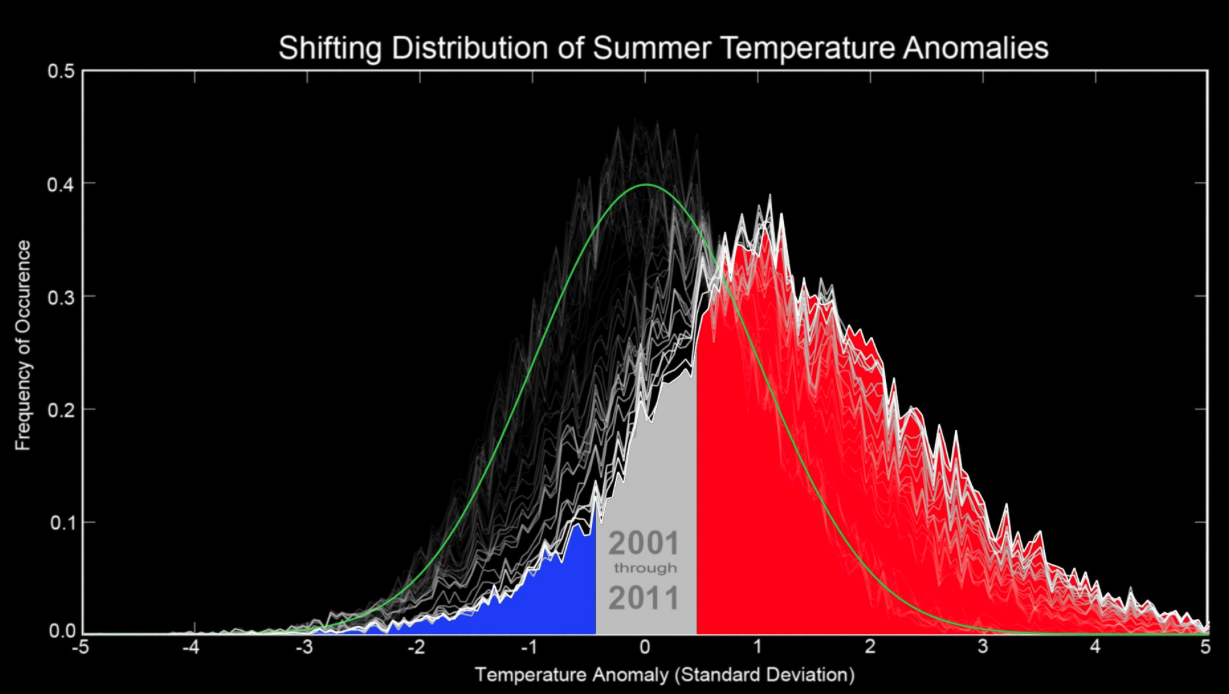
Last week an entertaining barrage of tweets erupted from Dr. Gavin Schmidt's account in response to a blog piece written by Dilbert creator Scott Adams. Being that Adams' original tweet promoting his blog post makes the presumptuous claim of "saving the world" by teaching climate scientists how to communicate science, you can only imagine how this would raise the ire of more than a few actual real-life experts.

Aside from the ludicrous notion that saving the world somehow pivots on convincing "skeptics", Adams' fundamental fallacy is the notion that it's the job of climate scientists to convince "skeptics" that climate change is real. What we know from research is, when someone has taken a specific position as a "skeptic" of man-made climate change, adding more information generally produces a backfire effect. They actually reject the science more in response to more information. It doesn't matter how persuasive you are. Most anyone who has already made this choice is not going to be persuaded, regardless of how the science is packaged.
Schmidt's initial response suggests that he fully understands this, saying upfront that his comment would be unlikely to change Adams' thinking. And subsequent tweets from Adams confirm his expectation. But, for those who follow climate science and the public debate, Schmidt's tweets serve as an entertaining take down of Adams' untethered world-view.
For anyone who's spent time following Scott Adam's blog, you will know this is an utterly bizarre world of anti-logic where "persuasion" is the dog whistle of choice. I would describe his blog as an authoritarian version of Lewis Carol meets the Beatles on acid. The rhetoric is hard and absolute, not to be challenged, whilst the logic is non-linear, rejecting basic ideas like the existence of reality.
None of Adams' concepts are supported in any manner. He produces no research tied to it. There is no rigorous method applied to rationalize it. It's little more than cultish ramblings validated by a small loyal following acquired through his previous success as a cartoonist.
Gavin does a great job of explaining Scott's errors within the limitations of a Twitter thread. Other bloggers have also taken up the exchange at Greg Laden's Blog and at And Then There's Physics. But we can also take a little more time and look at these points individually.
Adams opens with this passage...
I don’t know much about science, and even less about climate science. So as a practical matter, I like to side with the majority of scientists until they change their collective minds. They might be wrong, but their guess is probably better than mine.
That said, it is mind-boggling to me that the scientific community can’t make a case for climate science that sounds convincing, even to some of the people on their side, such as me. In other words, I think scientists are right (because I play the odds), but I am puzzled by why they can’t put together a convincing argument, whereas the skeptics can, and easily do. Shouldn’t it be the other way around?
As a public service, and to save the planet, obviously, I will tell you what it would take to convince skeptics that climate science is a problem that we must fix. Please avoid the following persuasion mistakes.
One might reasonably assume that the points that followed would make a serious attempt to demonstrate where the scientific community doesn't make convincing arguments, and one might assume examples of strong "skeptic" points. As you'll see, neither are delivered. Instead we're left with the sense Adams is not only far out of his depth relative to climate science, but he's also far removed from what actual cognitive research finds.
His list of points follow:
"1. Stop telling me the “models” (plural) are good. If you told me one specific model was good, that might sound convincing. But if climate scientists have multiple models, and they all point in the same general direction, something sounds fishy. If climate science is relatively “settled,” wouldn’t we all use the same models and assumptions?"
Here Adams show us his severely limited understanding of what climate models actually are. He fails to grasp the idea that climate models are a boundary conditions experiment rather than an initial conditions one. You can't create one really good computer model and ever expect that it will be representative of the planetary climate system when what's being modeled is a chaotic system. Even reality wouldn't operate this way!
Think of it like this. If you could instantly replicate the Earth (solar system and all) and start both Earth(a) and Earth(b) in precisely the same states, within a short time the two climate systems would diverge, even though they would continue to operate within the limits of the forcings imposed on them. This is what models also do. What models and model runs are telling us is, what are the boundary conditions within which the climate system will progress given known forcings.
2. Stop telling me the climate models are excellent at hindcasting, meaning they work when you look at history. That is also true of financial models, and we know financial models can NOT predict the future. We also know that investment advisors like to show you their pure-luck past performance to scam you into thinking they can do it in the future. To put it bluntly, climate science is using the most well-known scam method (predicting the past) to gain credibility.
Again, Adams does not grasp what climate models are. There is a functional difference between financial/economic models and climate models in that climate models are bound by physics (link). Financial models are statistical rather than physics based. Conflating the two is essentially a way to avoid making the effort to understand the value proposition climate modeling presents to the body of science.
3. Tell me what percentage of warming is caused by humans versus natural causes. If humans are 10% of the cause, I am not so worried. If we are 90%, you have my attention. And if you leave out the percentage caused by humans, I have to assume the omission is intentional. And why would you leave out the most important number if you were being straight with people? Sounds fishy.
Anyone who follows climate science – even peripherally – will understand Adams is ignorant of human attribution research. The only thing fishy here is that Scott doesn't even attempt to research this before making an assumption and expounding on the subject in a blog post.
The single most discussed part of the IPCC reports is the attribution statement! They state that most or all of the warming of the past 50 years is very likely due to human contributions of greenhouse gases. Gavin demonstrates that the likely contribution is 110%. It's not like this is hidden information. It's not like it hasn't been discussed ad nauseam on almost every climate blog around, for years. Scott merely hasn't read it yet, and has the audacity to presume he has something of value to offer to the scientific community on how to communicate this matter.

4. Stop attacking some of the messengers for believing that our reality holds evidence of Intelligent Design. Climate science alarmists need to update their thinking to the “simulated universe” idea that makes a convincing case that we are a trillion times more likely to be a simulation than we are likely to be the first creatures who can create one. No God is required in that theory, and it is entirely compatible with accepted science. (Even if it is wrong.)
Gavin waved this one off, for good reason, but this touches on the untethered aspect of Adams' world view that I mentioned above. It's a big non sequitur dropped into this topic, for what reason, we don't know.
Personally, I have no problem admitting that I do not understand quantum mechanics. I've read a number of popular books about it. I think it's a fascinating subject which I'm always eager to try to understand more. But QM is a world that is far outside of what we experience in our everyday lives. There is also an incredible void of experimental evidence that can validate what scientists say about the quantum realm. With QM there are many highly trained physicists poring through the math. They're checking the concepts. They're publishing research and arguing with each other to validate the concepts. Ultimately it all has to be testable to a level to convince the broader scientific community that there are realistic claims being made.
In this, even as a non-scientist, I can simultaneously not fully understand the subject but have a strong sense that, however strange the quantum world is, the subject is scientifically valid and important. I know this is a broadly accepted theory and has been so since the early part of the 20th century. As a non-scientists I know I'm not on thin ice to discuss quantum theory.
This is a complete contrast to Adams' "simulated universe." This idea has a basis in cognitive research in the work of Berkeley professor, Donald Hoffman. There's a good TED talk where he describes his research related to how our brains interpret reality. The challenge is, as with climate science, Adams is unequipped to analyze and interpret this cognitive research. Dr. Hoffman's work looks interesting. It's an area worth exploring. There were a number of logical leaps in his TED talk that I would want to know more about. But this research is definitely not established. It's a fairly new area Hoffman is exploring, and it may prove to reveal some interesting things about reality, but it also might not.
What Scott has done is spin it into, as he says, "[T]rillions of times more likely..." that reality is a simulation. (In his TED talk, Hoffman specifically suggests this is unlikely.) And out of that Adams flings off into a realm of dogmatic, non-linear, anti-logic untethered to anything rational, on par with 1960's pop guru's explaining "chakras" and "planes of enlightenment."
5. Skeptics produce charts of the earth’s temperature going up and down for ages before humans were industrialized. If you can’t explain-away that chart, I can’t hear anything else you say. I believe the climate alarmists are talking about the rate of increase, not the actual temperatures. But why do I never see their chart overlayed on the skeptics’ chart so we can see the difference? That seems like the obvious thing to do. In fact, climate alarmists should throw out everything but that one chart.
This one is particularly irksome to me because I've repeatedly done the work to show where "skeptics" are erroneously using temperature charts. I can only imagine that Scott is discussing the numerous misrepresentations of GISP2 data as global temperature data, where, in fact it's a local measure of temperature at the Greenland summit. Those charts have been "explained away" so many times that it's beyond absurdity.
It's unclear what "one chart" Scott thinks he's describing here. One of the basic tenets of science is, you can't make stuff up to support your preferred conclusions. There are many charts showing the rise in industrial era temperature, millennial temperature, holocene temperature and even temperature extending back over many millions of years. This information is easily accessible to anyone interested in reading the actual published research, or even taking the time to read the IPCC reports.
6. Stop telling me the arctic ice on one pole is decreasing if you are ignoring the increase on the other pole. Or tell me why the experts observing the ice increase are wrong. When you ignore the claim, it feels fishy.
What smells fishy is that Adams hasn't taken the time to read what scientists say about NH vs SH sea ice. It's easily available. The National Snow and Ice Data Center has a very clear description of what is happening. And ironically, Scott makes this claim during a season when we've just witnessed an extreme decrease in Antarctic sea ice.

7. When skeptics point out that the Earth has not warmed as predicted, don’t change the subject to sea levels. That sounds fishy.
I'm not sure what Scott's preoccupation with fish is, but what is abundantly obvious about this comment is... No one does this. He certainly doesn't bother to offer a citation or example of where this has happened. My experience has been that, when "skeptics" talk about this topic, scientists address it. Repeatedly. This particular stinking zombie myth has had its head removed from its body more times than there are pages in all of George R. R. Martin's novels combined.
8. Don’t let the skeptics talk last. The typical arc I see online is that Climate Scientists point out that temperatures are rising, then skeptics produce a chart saying the temperatures are always fluctuating, and have for as far as we can measure. If the real argument is about rate of change, stop telling me about record high temperatures as if they are proof of something.
Again, Scott presumes that adding more information is going to change a "skeptic's" position. If we just keep giving them the information that scientists 'should' be giving them, that would fix it. Research shows that Adams is deeply misinformed. Scientists are not ever going to change the minds of confirmed "skeptics" any more than Martin Luther King caused any racist to change their position. MLK was effective because he confronted the facts of a critical issue in ways that made people uncomfortable. Dr. King forced us to face reality.
9. Stop pointing to record warmth in one place when we’re also having record cold in others. How is one relevant and the other is not?
Because there are more of the former than the latter, Scott. This is the shifting temperature distribution predicted by climate scientists many decades ago. Fewer low temperature extremes and more high temperature extremes. To even have a chance of understanding climate science would require familiarizing one's self with what a distribution curve represents.

10. Don’t tell me how well your models predict the past. Tell me how many climate models have ever been created, since we started doing this sort of thing, and tell me how many have now been discarded because they didn’t predict correctly. If the answer is “All of the old ones failed and we were totally surprised because they were good at hindcasting,” then why would I trust the new ones?
Reprise #2. It's not clear how Adams concludes this would have any affect on persuading anyone since his understanding of models is essentially non-existent, nor is it clear how he even gets to "If the answer is..." Adams should trust what experts say about their models, but that involves actually taking the time to listen to what climate modelers are saying about their work.
11. When you claim the oceans have risen dramatically, you need to explain why insurance companies are ignoring this risk and why my local beaches look exactly the same to me. Also, when I Google this question, why are half of the top search results debunking the rise? How can I tell who is right? They all sound credible to me.
Here we get a double barreled straw man argument. It's not clear how he concludes that anyone is saying that sea level has risen dramatically. Certainly sea level is rising. It's rising faster than in the past. SLR is accelerating. But I'm not sure that could be properly stated as "oceans have risen dramatically." And where is Scott's data coming from suggesting that insurance companies are ignoring SLR? I find that insurance companies are highly cognitive of the inherent risks.
It is certainly reasonable to ask why Google delivers inaccurate information on sea level rise. If I had any Google exec standing in front of me right now, I'd be forcefully asking the exact same question. It definitely takes a certain level of skill to validate what is a reliable source of information and what isn't (I frequently have this discussion with my own teenaged kids). I have to admit, though. I'm more than a little suspicious that Scott actually does have the capacity to know a reliable source when he sees it. I think he actually prefers being confused for his own particular purposes of being (faux) incensed about climate communication.
And, yes Scott, with 1 meter of SLR in 2100, your local beach will look significantly different.
12. If you want me to believe warmer temperatures are bad, you need to produce a chart telling me how humankind thrived during various warmer and colder eras. Was warming usually good or usually bad?
Again here, I have my doubts that this is a genuine question, but rather just a randomly crafted point without any substance. Humans, in our current form, have only been around for perhaps 200,000 years. The last interglacial (the Eemian; 120kya) global temperature reached only, perhaps, 1°C higher than today. There were precious few of us and we nearly went extinct along the way. Our early survival can easily be ascribed to luck as much as our capacity as an adaptive species.
The challenge we face is that we have 7 billion people alive today. We will likely be pushing past 9 billion this century, while we're potentially going to warm the planet some 4°C over the stable preindustrial temperature range that gave rise to modern human civilization. It would take an extreme level of deliberate ignorance to avoid the obvious conclusions that this implies.
13. Stop conflating the basic science and the measurements with the models. Each has its own credibility. The basic science and even the measurements are credible. The models are less so. If you don’t make that distinction, I see the message as manipulation, not an honest transfer of knowledge.
Reprise #2, again. We've already established that Adams is nearly clueless about what models are or what they do.
14. If skeptics make you retreat to Pascal’s Wager as your main argument for aggressively responding the climate change, please understand that you lost the debate. The world is full of risks that might happen. We don’t treat all of them as real. And we can’t rank any of these risks to know how to allocate our capital to the best path. Should we put a trillion dollars into climate remediation or use that money for a missile defense system to better protect us from North Korea?
We have no way to conclude what Scott is talking about when he doesn't offer any reference here. We all know Pascal's Wager is the idea that you should believe in God because, if God is real then you go to heaven, and if he's not it doesn't matter anyway, assuming an omnipotent being wouldn't see through such a thin ruse.
The problem is, no one in the climate science community makes this argument. Literally, no one. What scientists do is present the available scientific understanding. The research acts to constrain the range of what is reasonable and rational. Within the constrained range of understanding we have the opportunity to make specific and hopefully effective decisions on how to best respond to threats.
Adams puts forth classic false equivalences. Usually people frame this as, should we spend money to eliminate hunger or invest in climate mitigation. That's a false choice since no one is suggesting that we address climate instead of other issues. Climate change is a threat multiplier. We can't ignore any of the many other critical human issues we face. But addressing climate change will help to ensure those other issues don't become much more critical along the way.
Scott ends with this...
Anyway, to me it seems brutally wrong to call skeptics on climate science “anti-science” when all they want is for science to make its case in a way that doesn’t look exactly like a financial scam.* Is that asking a lot?
People ask me why I keep writing on this topic. My interest is the psychology around it, and the persuasion game on both sides. And it seems to me that climate scientists are the Hillary Clinton of scientists. They think facts and reason will persuade the public. Even though science knows that doesn’t generally work.
Ironically, Scott ends saying that scientists know that facts and reason won't persuade anyone, after he's ranted on about 14 points of why the facts and reason sound "fishy" to him. Like a large number of "skeptics", Adams has amply demonstrated that he has no interest in (or is too lazy to) even starting to understand climate science topics. He demonstrates a fundamental level of ignorance related to each and every topic discussed. And somehow he believes conveying that ignorance will help to inform climate scientists how to persuade "skeptics."
Throughout this piece I've used scare quotes on the term "skeptic" for the very reason that Scott Adams has embodied here. He is not – in any way, shape or form – skeptical, nor are any of those whom he purports to be speaking for. Skepticism requires the humility and self-awareness to know when you don't have a sufficient grasp of a topic to substantively discuss it. Skepticism requires that you take the time to fully inform yourself before attempting any of the kinds of conclusions he puts forth. As has been stated over and over again, this is not skepticism. This is "white walker" level denial.

Scott claims that his interest here is the psychology, but there is an ample body of cognitive science that is specifically directed to the climate science issue which (a) Adams does not refer to nor intimates that he even understands exists, and (b) most certainly has not contributed to in any substantial (or even glancing) manner.
Facts and reason are what scientists do regardless of what people choose to believe. That has been true since the earliest application of science. Facts and reason are what gave us modern society. What is most exciting about science is that it can tell us things that we don't know, and sometimes science tells us things we don't want to believe. It's not the scientists' job to repackage reality based on what people will be persuaded by. It is the job of individuals to have the humility to stop and listen when the scientific community is in broad agreement on critical scientific issues like climate change, and from that take appropriate informed actions.
By the same right, science does need effective communication in order for more people to understand what scientific research is telling us. There is a long list of very effective communicators out there already. But these are people who actually understand the science they're communicating, or people who are working in conjunction with scientifically trained advisors. Any potential value that Scott Adams might bring to the table is significantly undermined by his lack of knowledge on the topics of climate science and cognitive science, which is further compounded by his peculiar brand of sociopathy.
And... No, I don't expect Scott Adams to be "persuaded" by any of this.
Posted by Rob Honeycutt on Tuesday, 14 March, 2017
 |
The Skeptical Science website by Skeptical Science is licensed under a Creative Commons Attribution 3.0 Unported License. |